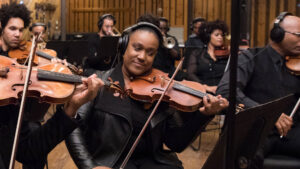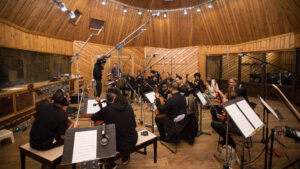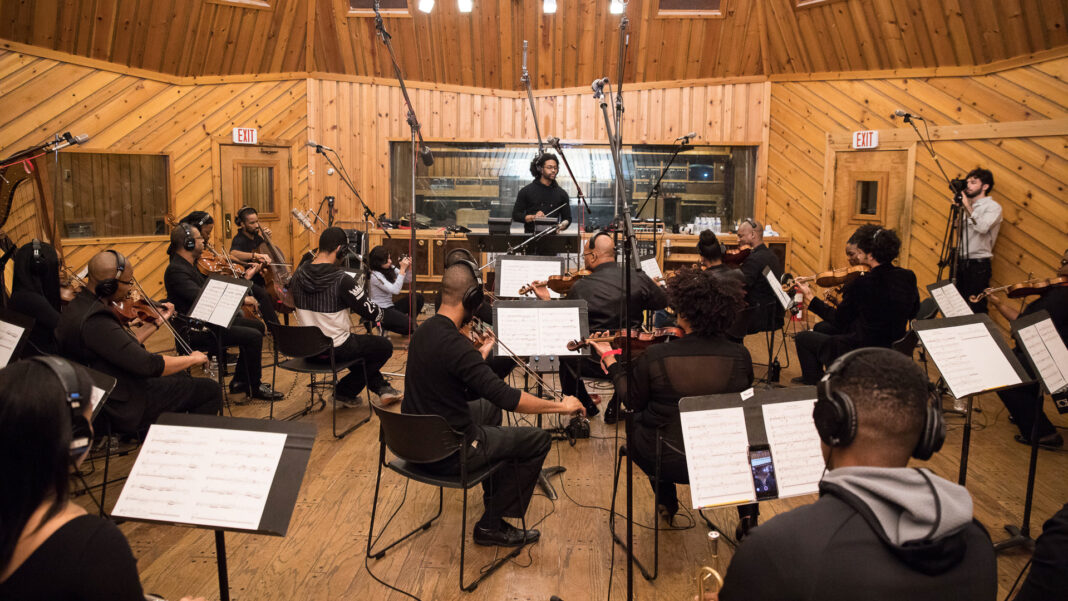
“There’s just so many more people who can’t even fit on the stage at the Bowl. There’s so many of us that could very easily be there and share that space.” First the Bowl being referenced is the Hollywood Bowl. The “us” refers to Black classical musicians. The person speaking is Stephanie Matthews one of the co-founders to The Re-Collective Orchestra. Along with composer Matt Jones, Matthews co-founded the orchestra in 2018.
The Re-Collective Orchestra will become the first all-Black orchestra to play the Hollywood Bowl on Sunday for Juneteenth: A Global Celebration of Freedom that will also be shown globally on CNN. Thomas Wilkins and Derrick Hodge will serve a conductors. Special guests include Jhené Aiko, Debbie Allen Dance Academy, Lucky Daye, Bell Biv DeVoe, Earth Wind & Fire, Robert Glasper, Mickey Guyton, Anthony Hamilton, Khalid, Chaka Khan, Mary Mary, Killer Mike, Billy Porter, The Roots, Amir Sulaiman and Michelle Williams
Since their founding The Re-Collective Orchestra has recorded with Hans Zimmer music for the new recent of The Lion King and with artists Adele, Chance the Rapper and John Legend.
I recently spoke via Zoom with Matthews about navigating the often-time entrenched world of classical music, who the artists are who make up their orchestra and about what the future might hold for them. What follows are excerpts from our conversation that have been edited for length and clarity. If you want to see the full interview, please go our YouTube channel.
What are the biggest changes of the public’s awareness you’ve seen over the four years since The Re-Collective Orchestra was founded?
I think, honestly, people have been maybe a bit more inquisitive about what diversity really means in American orchestras specifically. There have been numerous conversations about diversity, equity and inclusion at all the conferences, all the panels, all the discussions. For me, personally, it just seems to be a very circular conversation about how to go about finding a solution and how to start moving the needle and really making real change happen. I think that really has jumpstarted a lot of difficult conversations. I don’t know that it has been as transformative in the way that I think it really could be if everyone could really see it. It’s one thing to hear about it and to talk about it and it’s another thing to to witness it and to experience it.
What are your hopes for the message that the in-person and television audience will receive and the awareness that will be built vis-a-vis this Juneteenth concert?
I think the awareness that Black classically-trained musicians have been here for a very, very long time. We’ve been working in the traditional classical space in the performing arts sector for a very long time. We’ve been graduating from the top music schools and conservatories for a very long time. So this notion that no one can seem to find all of these magical Black people is just tiresome. There’s a lot of ground to cover as far as the diversity aspect and really making sure that we are creating truly equitable workspaces. I think there’s something really valuable about building this space for Black musicians and also to inspire the next generation of creatives to say, you can do something different, too.
Not everyone may be quick to jump on first for that vision or sign on for that vision, but, yes, you have value. And I think that’s something that everyone needs to truly feel and not just a select few. I think shaping that perspective and narrative – and not just for Black musicians – although I think that this is really important for us and for our community to see it as well. Is this a viable option for my kids to pursue? Will my kids be able to support themselves financially and make a true career out of this that is fulfilling and rewarding? These are questions that I think any parent would have.
How much do you think a change in the diversity of management is required for these changes to take place on stages and among the personnel that make up an orchestra?
That’s a great question. I really feel like there has to be an overhaul of the structure itself. I don’t think it’s just a matter of remove this one person and remove this one person. I think that you really need to overhaul the structure because we see problems from the top down, right, and everywhere in between. Are there checks and balances with the personnel manager and how they’re interfacing with the musicians? What are the protocols for certain instances that people are reporting? And it’s he said versus she said or he said versus he said or she said versus you know what I’m saying? So what is the remedy? And I think that that’s really where we’re going to start seeing real changes happen. Then we have the pipeline question and talking about what’s going on at the music school and conservatory level and pre-college and and access and resources. We’ve got to really overhaul this system.
And The Re-Collective Orchestras has the musicians and artists to do that.

So many of the musicians in in our orchestra are tenured professionals with many of the top American orchestras. We have a great mix of professional full-time orchestral players, some freelance players, some people who tour and work in mainstream music forms and television and film scoring. We’ve all graduated from a lot of the same schools.
So either due to a complete lockout of certain professional opportunities or really just saying, “Hey, I’m going to go where I’m valued,” we’ve kind of taken different pathways. It’s so nice to see how we’re able to converge and have these conversations because I think that’s really what helps problem solve.
It seems as though you are following the adage that if you want something done right you have to do it yourself.
We’re not the only ones doing the work. What makes us a little bit different is we don’t necessarily focus on the traditional classical repertoire. Can we play it? Absolutely. Surely we can. But I think that there’s something to be said about the notion of what Black music is and also the versatility of what it means to be a musician in 2022. Obviously we know that there is a sense of elitism in the classical music industry and what is highbrow art and what is lowbrow art. I just think at this stage so many of us – and I’m not not just talking about Black musicians – but artists and creatives are just tired of living in a box. We want to create art that we love, that we’re inspired by and collaborate with people and artists that we are inspired by. That in turn inspires everyone else.
One of my favorite politicians from the 1970s was Shirley Chisholm. She said, “I don’t measure America by its achievement, but by its potential.” What is the potential America possesses today and what does that potential offer The Re-Collective Orchestra?
I think there is a great amount of potential in this burgeoning younger generation. There’s a lot of energy there. There’s a lot of passion there. I think what we’re starting to see is the uncovering of the establishment as we know it. It’s starting to be challenged in a real way. I would dare say we’re seeing it across the board, not just in the arts sector. And I think that there’s a lot of potential there. I think that any time that we’ve really seen real change it’s been because of the action and the movement from the youth. They have the energy for it and there’s a certain fearlessness and fire behind them. If we can empower them to have the stamina to see this thing through I think we’re going to see a lot of very, very innovative organizations. I think we’re going to see more innovative leadership of this country.
We have this melting pot of cultures and people and experiences and perspectives. I think that’s what makes us really great. If we can somehow empower these young thinkers, young creators and these young innovators to push through some really challenging times, especially coming out of this crazy pandemic and really take advantage of this shift, I’m very hopeful that we will see a much better outcome on the other side. For me that’s the potential that I see and that I’m hoping for.
To watch the full interview with Stephanie Matthews, please go here.
Main Photo: The Re-Collective Orchestra (Courtesy Los Angeles Philharmonic Association)












[…] https://culturalattache.co/2022/06/17/the-re-collective-orchestra-should-need-no-introduction/ […]